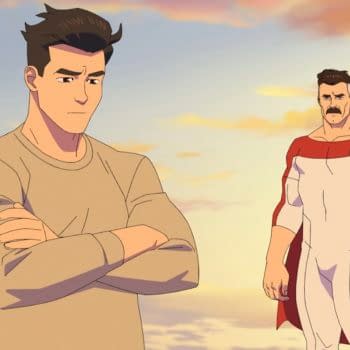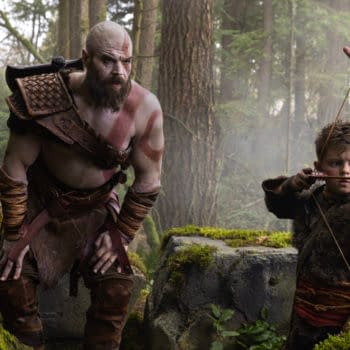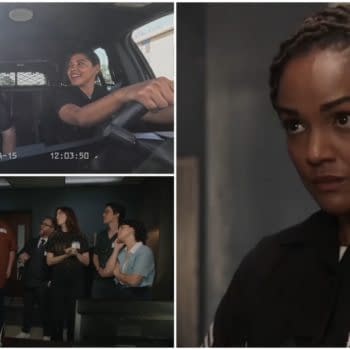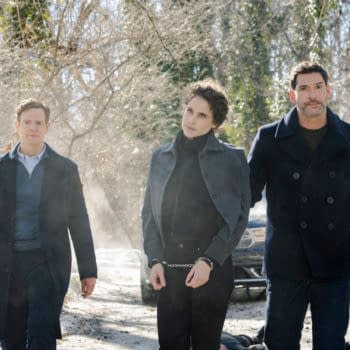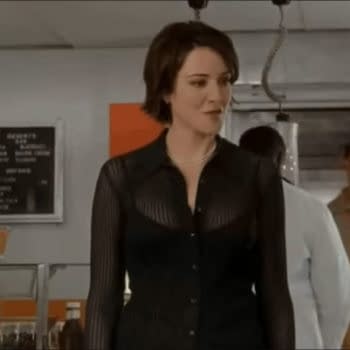Posted in: CW, TV | Tagged: buffy, buffy the vampire slayer, spike
"Buffy Sent Me Into Therapy": James Marsters Reflects on "Seeing Red"
James Marsters discusses why Buffy the Vampire Slayer S06E19: "Seeing Red" was a "personal hell" to film and that it sent him to therapy.
In Joss Whedon's Buffy the Vampire Slayer Season 6 Episode 19: "Seeing Red," viewers were presented with a moment that continues to be discussed and debated since it first aired in 2002. At one point in the episode, a wounded Buffy (Sarah Michelle Gellar) returns home to heal, only to be interrupted by an uninvited Spike (James Marsters), who attempts to convince Buffy that she loves him and that she just needs to admit it to herself. When Buffy protests, Spike's reactions turn violent, and Buffy is barely able to defend herself from his rape attempt. Horrified by his actions, Spike attempts an apology – while Buffy responds by telling him that the only reason he stopped was because she was able to force him to stop.
Checking in with Michael Rosenbaum (Smallville, It's Always Sunny in Philadelphia) on the latter's Inside of You podcast, Marsters revisits the episode and those infamous moments. "'Buffy' sent me into therapy, actually. 'Buffy' crushed me," Marsters shared. "It's a problematic scene for a lot of people who like the show. And it's the darkest professional day of my life." From there, Marsters offered some insights into the creative decision-making behind taking the Buffy/Spike dynamic in that direction.

"The writers were being asked to come up with their worst day, the day that they don't talk about, their dark secret, the one that keeps them up at night, when they really hurt somebody or when they really got hurt or made a big mistake of some kind, and then slap metaphoric fangs on top of that dark secret and tell everybody about it," Marsters shared. "One of the women writers actually had come up with this idea because in college she had gotten broken up with, and she went to her ex's place and thought that if they made love one more time, everything would be fixed. She kind of forced herself, and he had to physically remove her from the premises, and that was one of the most painful memories of that time of her life."
In terms of how the audience would view the scene, Marsters noted that he expressed his concerns to the writers. "They thought that since Buffy was a superhero that they could flip the sexes since Buffy could defend herself very, very easily from this. They thought that they could have a man do it to a woman, and it would be the same thing. I went to them, and I said, 'You know, guys, we're providing a vicarious experience for the audience. Everyone who's watching Buffy is Buffy, and they're not superheroes, so I'm doing this to every member of the audience, and they're going to have a very different reaction," he revealed.
Contractually locked in, Marsters and Gellar went ahead with the scene, leaving Marsters in what he would describe as "[my] personal hell" – one that would require him to seek help dealing with. "I don't like sexual predation scenes, anything that has to do with it. I don't audition for those things. If there's a movie with that kind of material, I don't go to see the movie. If it pops up on television, I've got to turn the television off before I break it. I have a very visceral reaction to that stuff," he explained.

Buffy the Vampire Slayer: James Marsters on "Seeing Red" (2023)
In honor of the 20th anniversary of "Buffy" ending its run back in March 2023, Marsters shared with RadioTimes.com the creative thought process that went into the decision, how it was a "horrible day" to film and more. "That was the crushing experience that she wanted to write about. I think that, because Buffy is a superhero and was fully capable of throwing Spike through a wall, they could flip the sexes. The point I was trying to make when I read that script was everyone who watches 'Buffy' is Buffy, that's the trick of storytelling…when I watch 'Buffy,' I'm Buffy. And the people out there watching 'Buffy' aren't superheroes. So I'm gonna be doing this to them. You can't flip the sexes on these characters and not have blowback; it's going to have unintended consequences," Marters shared about the scene, noting that the female writer who penned the scene shared her own experience of "throwing herself" at an ex-boyfriend and wanted "flip the sexes" to portray that mindset.
As Marsters sees it, the audience's growing love for Spike and their wanting to see him with Buffy fueled the creative team's need to show Spike in a bad light. "The other thing is that they were very frustrated because they couldn't convince the audience to stop rooting for Spike; they did not want the audience to say, 'Spike and Buffy forever,' that's just not what they were going for. They kept having me do worse and worse things, trying to get people to realise. Even Spike at one point goes, 'Hey guys, I'm evil.' Because the audience refused to do that, they finally landed on that scene. They kept having me do worse and worse things, and finally, they're like, 'OK, we're just gonna have him do that to Buffy like there's nothing else that we have that's going to make this point.' That was another reason for that scene."
In retrospect, Marsters still isn't sure if the scene was the right direction to go but he makes it clear that that a lot of thought & discussion was given to the scene and that it wasn't a "cavalier decision" by the writers. "When you know those things, maybe it will inform how you react to that scene. I don't know if it means it was the right thing to do. I know it doesn't seem to age well, but what I want people to know is it wasn't a cavalier decision. It wasn't just like, 'Oh well, these things are OK, and it might be sexy and spicy if we do this.' That wasn't what the writers were thinking at all. It was very well considered, and it was coming from a good place," Marsters explained. But Marsters also does hold back on how it felt filming the scene, adding, "It was the hardest day of my professional career, it sent me into therapy. I collapsed on set, I couldn't even speak; I was shaking. That was a horrible day…when that script came, I was contracted to do anything that they said to anybody that they said to do it. I was legally compelled to do that scene. It wasn't fun to watch, probably, but it wasn't fun to film either."




